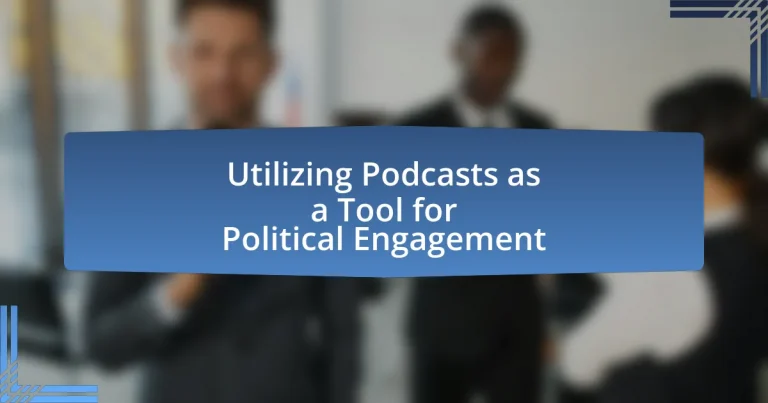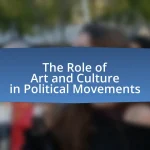Utilizing podcasts as a tool for political engagement involves leveraging audio content to inform and mobilize audiences around political issues and candidates. The article explores how podcasts facilitate political discussions through diverse voices, in-depth analysis, and audience engagement, distinguishing them from traditional media by fostering two-way conversations. It highlights the effectiveness of podcasts in enhancing political discourse, particularly among younger demographics, and discusses various types of political podcasts, including narrative-driven formats that resonate emotionally with listeners. Additionally, the article addresses challenges such as misinformation and political bias while outlining strategies for creating impactful political podcasts and future trends in the medium.
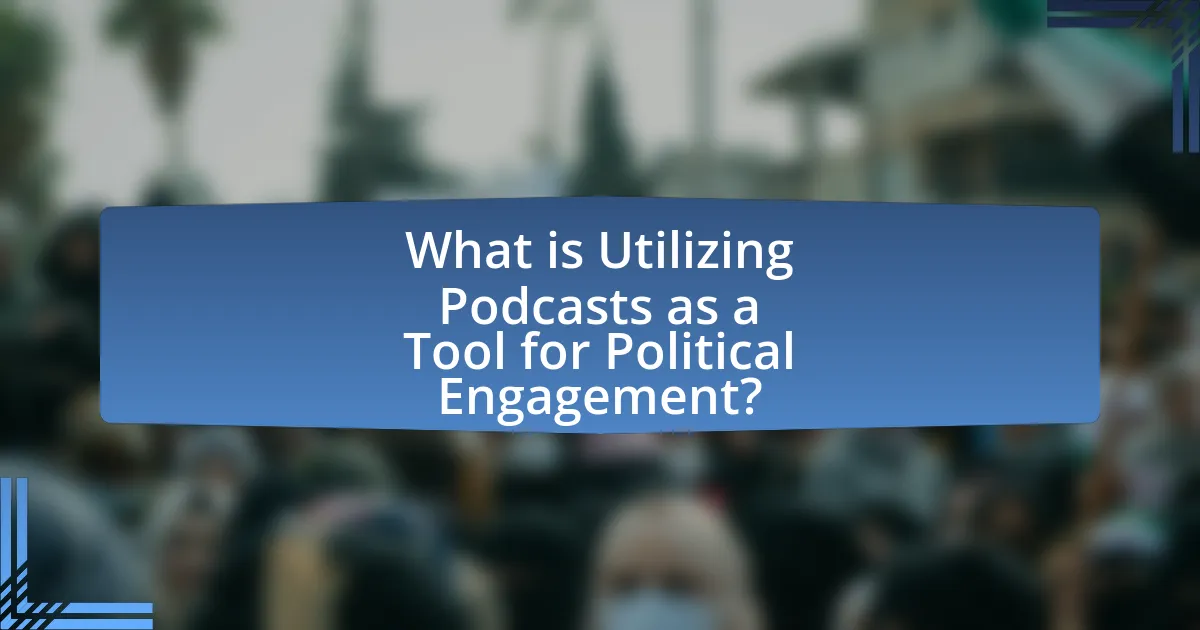
What is Utilizing Podcasts as a Tool for Political Engagement?
Utilizing podcasts as a tool for political engagement involves leveraging audio content to inform, mobilize, and connect audiences with political issues and candidates. Podcasts provide an accessible platform for discussions on policy, social justice, and civic participation, allowing listeners to engage with diverse perspectives. According to a 2021 Pew Research Center study, 41% of Americans reported listening to podcasts, indicating a significant reach for political messaging. This medium fosters community dialogue and encourages grassroots activism by enabling listeners to share episodes and engage in conversations about political topics.
How do podcasts facilitate political discussions?
Podcasts facilitate political discussions by providing accessible platforms for diverse voices and viewpoints. They allow listeners to engage with complex political topics in a conversational format, often featuring expert guests, activists, and everyday citizens. This format encourages critical thinking and fosters community dialogue, as evidenced by studies showing that podcast listeners are more likely to discuss political issues with others. For instance, a 2020 survey by Edison Research found that 55% of podcast listeners reported discussing topics from podcasts with friends or family, highlighting the medium’s role in stimulating political discourse.
What are the key features of political podcasts?
Key features of political podcasts include in-depth analysis, expert interviews, and audience engagement. Political podcasts often provide comprehensive discussions on current events, allowing listeners to gain a deeper understanding of complex issues. They frequently feature interviews with political analysts, activists, and policymakers, which adds credibility and diverse perspectives to the content. Additionally, many political podcasts encourage listener interaction through social media or live Q&A sessions, fostering a sense of community and active participation in political discourse. These elements collectively enhance the educational value and accessibility of political information for a broad audience.
How do podcasts differ from traditional media in political engagement?
Podcasts differ from traditional media in political engagement by offering a more intimate and accessible platform for discussion. Unlike traditional media, which often presents information in a one-way format, podcasts facilitate two-way conversations, allowing listeners to engage with hosts and guests through comments and social media. This interactive nature fosters a sense of community and encourages deeper discussions on political issues. Additionally, podcasts can reach niche audiences, providing tailored content that resonates with specific groups, which traditional media may overlook. According to a 2021 study by Edison Research, 41% of podcast listeners reported that they feel more informed about political issues compared to traditional media consumers, highlighting the effectiveness of podcasts in enhancing political engagement.
Why are podcasts an effective medium for political engagement?
Podcasts are an effective medium for political engagement because they provide accessible, in-depth discussions that can reach diverse audiences. The format allows for nuanced conversations, enabling listeners to explore complex political issues beyond soundbites. According to a 2021 study by Edison Research, 41% of Americans aged 12 and older have listened to a podcast, indicating a significant reach. Additionally, podcasts often foster a sense of community among listeners, encouraging dialogue and participation in political discourse. This engagement is further enhanced by the intimate nature of audio storytelling, which can create a personal connection to political topics and figures.
What demographic trends support the use of podcasts for political outreach?
The demographic trends supporting the use of podcasts for political outreach include the increasing popularity of audio content among younger audiences, particularly Millennials and Generation Z, who are more likely to consume news and political information through digital platforms. According to Edison Research’s “The Infinite Dial 2023,” 62% of Americans aged 18-34 listen to podcasts monthly, indicating a strong engagement with this medium. Additionally, the diverse range of podcast topics allows for targeted messaging that resonates with specific demographic groups, enhancing the effectiveness of political outreach efforts. This trend is further supported by the fact that 54% of podcast listeners report being more likely to support brands or causes discussed in podcasts, demonstrating the potential for political campaigns to leverage this medium for engagement.
How do podcasts enhance accessibility to political content?
Podcasts enhance accessibility to political content by providing on-demand audio formats that can be consumed anytime and anywhere, thus reaching a broader audience. This medium allows listeners to engage with political discussions, interviews, and analyses without the constraints of traditional media schedules. According to a 2021 report by Edison Research, 41% of Americans aged 12 and older have listened to a podcast, indicating a significant and growing audience for this format. Additionally, podcasts often feature diverse voices and perspectives, making political content more relatable and inclusive, which further encourages engagement among listeners who may feel marginalized by mainstream media.
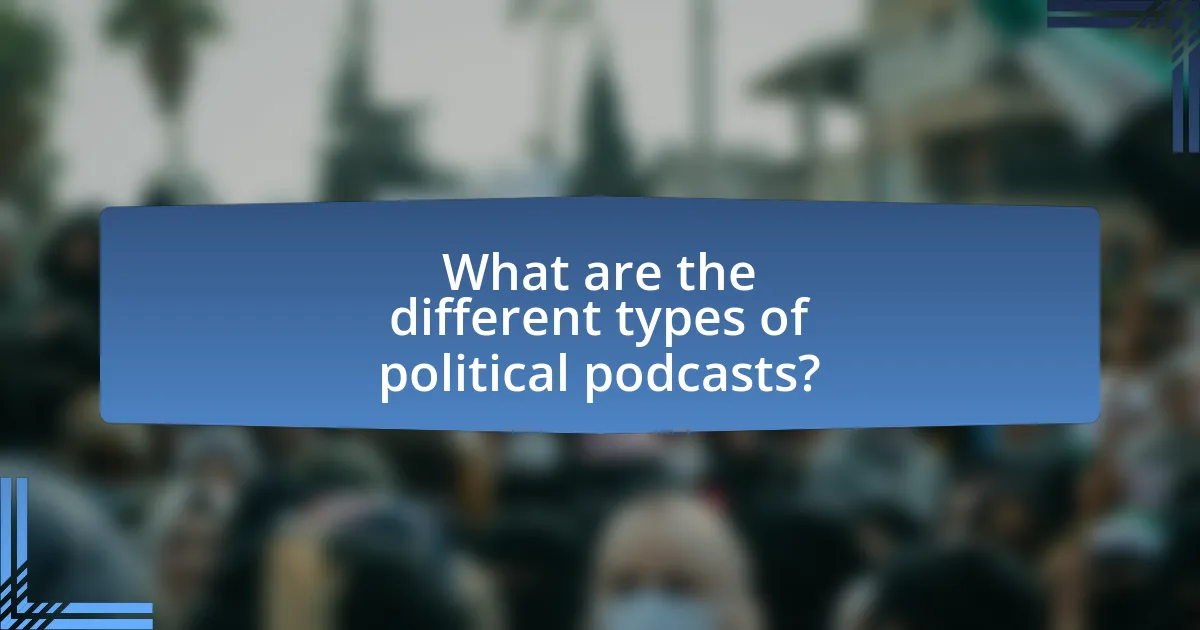
What are the different types of political podcasts?
Political podcasts can be categorized into several types, including news analysis, interviews, commentary, educational, and narrative storytelling. News analysis podcasts focus on current events and provide in-depth discussions on political issues, often featuring expert opinions. Interview podcasts typically host politicians, activists, or scholars to discuss their perspectives and experiences. Commentary podcasts offer personal viewpoints on political topics, often infused with humor or satire. Educational podcasts aim to inform listeners about political systems, history, or theory, while narrative storytelling podcasts present political events or figures through engaging narratives. Each type serves a unique purpose in enhancing political engagement and understanding among listeners.
How do interview-based podcasts contribute to political discourse?
Interview-based podcasts contribute to political discourse by providing a platform for in-depth discussions that enhance public understanding of political issues. These podcasts often feature experts, politicians, and activists who share insights and personal experiences, allowing listeners to engage with complex topics in a more relatable manner. For instance, a study by the Pew Research Center found that 51% of podcast listeners reported that podcasts helped them understand current events better. This format encourages critical thinking and fosters dialogue among diverse audiences, ultimately enriching the democratic process.
What are the benefits of featuring diverse voices in political interviews?
Featuring diverse voices in political interviews enhances representation, enriches discourse, and fosters inclusivity. By incorporating a variety of perspectives, political interviews can address the multifaceted nature of societal issues, ensuring that marginalized communities are heard. Research indicates that diverse representation in media leads to more comprehensive coverage of topics, as seen in studies by the American Press Institute, which highlight that audiences respond positively to content that reflects their own experiences and backgrounds. This approach not only broadens the understanding of political issues but also encourages greater civic engagement among underrepresented groups, ultimately strengthening democracy.
How do interviews shape listener perceptions of political issues?
Interviews shape listener perceptions of political issues by providing personal narratives and expert insights that influence understanding and opinions. Through the format of interviews, listeners are exposed to diverse viewpoints and emotional stories, which can humanize complex political topics. Research indicates that narratives in interviews can lead to increased empathy and engagement, as evidenced by a study published in the Journal of Communication, which found that storytelling in political discourse significantly affects audience attitudes and beliefs. This mechanism allows listeners to connect with the material on a personal level, thereby altering their perceptions of political issues.
What role do narrative-driven podcasts play in political engagement?
Narrative-driven podcasts significantly enhance political engagement by providing compelling storytelling that resonates with listeners. These podcasts often present complex political issues in an accessible format, allowing audiences to connect emotionally and intellectually with the content. For instance, research from the Pew Research Center indicates that 32% of podcast listeners report that podcasts help them understand political issues better, highlighting the effectiveness of narrative in simplifying and humanizing political discourse. Additionally, narrative-driven formats can foster community discussions and mobilize listeners to participate in political actions, as evidenced by the success of podcasts like “Pod Save America,” which encourages civic engagement through storytelling and relatable narratives.
How can storytelling influence political opinions?
Storytelling can significantly influence political opinions by shaping narratives that resonate emotionally with audiences. Through compelling narratives, storytelling humanizes complex political issues, making them more relatable and understandable. For example, studies have shown that personal stories can evoke empathy and alter perceptions, as evidenced by research from the University of California, which found that narratives can lead to increased support for policies like immigration reform when individuals hear personal accounts from affected parties. This emotional engagement can shift public opinion by fostering a deeper connection to the issues at hand, ultimately impacting political discourse and decision-making.
What are some successful examples of narrative-driven political podcasts?
Some successful examples of narrative-driven political podcasts include “Pod Save America,” “The Daily,” and “Slow Burn.” “Pod Save America,” created by former Obama staffers, combines storytelling with political analysis, engaging listeners with its conversational style and in-depth discussions on current events. “The Daily,” produced by The New York Times, offers a narrative approach to news, focusing on one major story each episode, which helps listeners understand complex political issues. “Slow Burn,” from Slate, explores historical political events through a narrative lens, providing context and depth to significant moments in American politics, such as Watergate and the impeachment of Bill Clinton. These podcasts have garnered large audiences and critical acclaim, demonstrating the effectiveness of narrative in political engagement.
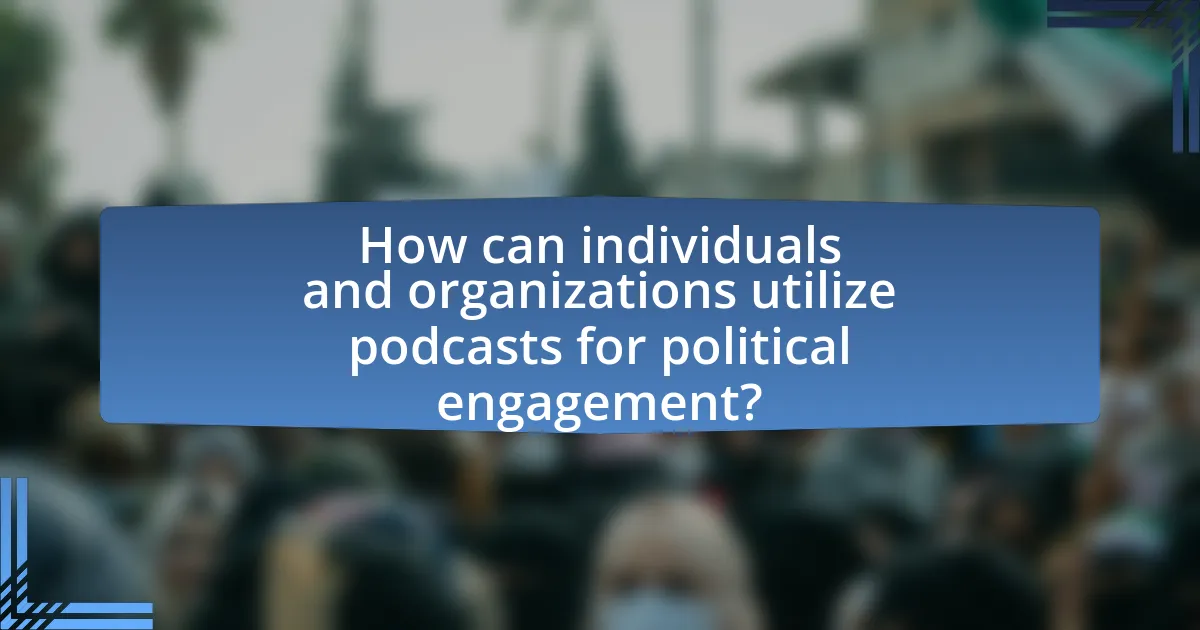
How can individuals and organizations utilize podcasts for political engagement?
Individuals and organizations can utilize podcasts for political engagement by creating content that informs, educates, and mobilizes listeners around specific political issues. Podcasts allow for in-depth discussions, interviews with experts, and storytelling that can resonate emotionally with audiences, fostering a deeper understanding of political topics. For instance, the podcast “Pod Save America” has successfully engaged millions by discussing current events and encouraging civic participation, demonstrating the effectiveness of this medium in reaching and influencing public opinion. Additionally, organizations can leverage podcasts to build community, share calls to action, and provide resources for grassroots organizing, thereby enhancing their political impact.
What strategies can be employed to create impactful political podcasts?
To create impactful political podcasts, producers should focus on clear messaging, engaging storytelling, and expert interviews. Clear messaging ensures that the podcast’s purpose and key points are easily understood by the audience, which is crucial for effective communication in political discourse. Engaging storytelling captivates listeners, making complex political issues relatable and memorable; for instance, using personal anecdotes or case studies can illustrate broader themes. Expert interviews provide credibility and depth, allowing listeners to gain insights from knowledgeable figures in the political arena, which can enhance the podcast’s authority and appeal. Research indicates that podcasts featuring expert guests tend to have higher listener retention rates, demonstrating the effectiveness of this strategy.
How can content be tailored to engage specific audiences?
Content can be tailored to engage specific audiences by understanding their demographics, interests, and preferences. For instance, political podcasts can analyze listener data to identify age groups, political affiliations, and topical interests, allowing creators to customize content that resonates with those specific characteristics. Research shows that targeted messaging increases engagement; a study by the Pew Research Center found that 64% of podcast listeners prefer content that aligns with their personal beliefs and interests. By leveraging this data, podcasters can create episodes that address relevant issues, use relatable language, and incorporate audience feedback, thereby enhancing listener connection and participation.
What are best practices for promoting political podcasts effectively?
To promote political podcasts effectively, utilize targeted social media advertising to reach specific demographics interested in political content. Research indicates that platforms like Facebook and Twitter allow for precise audience targeting, which can increase engagement rates significantly. Additionally, collaborating with influencers in the political sphere can enhance visibility; studies show that influencer partnerships can boost audience reach by up to 60%. Engaging listeners through interactive content, such as Q&A sessions or polls, fosters community involvement and encourages sharing, further amplifying the podcast’s reach. Consistent branding and messaging across all promotional channels also reinforce recognition and loyalty among listeners.
What challenges do creators face in using podcasts for political engagement?
Creators face several challenges in using podcasts for political engagement, primarily including audience reach, content saturation, and platform limitations. The difficulty in reaching a broad audience stems from the competitive nature of the podcasting landscape, where thousands of shows vie for listener attention, making it hard for new or niche political podcasts to gain traction. Additionally, content saturation means that many political topics are already extensively covered, leading to challenges in offering unique perspectives that can engage listeners effectively. Furthermore, platform limitations, such as algorithm biases on podcast hosting services, can restrict visibility and accessibility, hindering creators’ efforts to engage politically motivated audiences. These challenges are supported by data indicating that over 2 million podcasts exist, with many struggling to maintain listener engagement due to these factors.
How can misinformation be addressed in political podcasting?
Misinformation in political podcasting can be addressed through fact-checking, promoting media literacy, and encouraging transparency. Fact-checking involves verifying claims made in podcasts against credible sources, which can help listeners discern accurate information. For instance, organizations like PolitiFact and FactCheck.org provide resources that can be utilized by podcasters to validate their content. Promoting media literacy equips audiences with the skills to critically evaluate information, fostering a more informed listener base. Additionally, encouraging transparency by disclosing sources and potential biases can build trust and accountability in podcasting. Research indicates that transparency in media can significantly enhance audience trust, as shown in studies by the Pew Research Center, which found that audiences are more likely to trust sources that openly share their methodologies and biases.
What are the potential pitfalls of political bias in podcast content?
Political bias in podcast content can lead to misinformation and polarization among audiences. When podcasts present biased viewpoints, they may distort facts or omit critical information, which can mislead listeners about political issues. Research indicates that exposure to biased media can reinforce existing beliefs and contribute to echo chambers, where individuals only engage with perspectives that align with their own, further entrenching divisions in society. For instance, a study by the Pew Research Center found that partisan media consumption significantly influences political attitudes and perceptions, highlighting the risks associated with biased content in shaping public opinion.
What are the future trends in utilizing podcasts for political engagement?
Future trends in utilizing podcasts for political engagement include increased personalization, interactive content, and integration with social media platforms. Personalization allows listeners to receive tailored political content based on their preferences, enhancing engagement. Interactive content, such as live Q&A sessions or audience polls during episodes, fosters a two-way dialogue between politicians and constituents. Additionally, the integration of podcasts with social media platforms facilitates broader reach and encourages sharing, which can amplify political messages. According to a 2022 report by Edison Research, 41% of Americans aged 18-34 listen to podcasts regularly, indicating a growing audience that can be effectively engaged through this medium.
How might technology influence the evolution of political podcasts?
Technology significantly influences the evolution of political podcasts by enhancing accessibility, interactivity, and content distribution. The rise of mobile devices and streaming platforms allows listeners to access political content anytime and anywhere, increasing audience reach. Additionally, advancements in audio editing software and recording technology enable creators to produce high-quality content more efficiently, attracting a broader audience. Data analytics tools provide insights into listener preferences, allowing podcasters to tailor their content to meet audience demands effectively. Furthermore, social media integration facilitates real-time engagement, enabling listeners to interact with hosts and participate in discussions, thereby fostering a more dynamic political discourse. These technological advancements collectively shape the landscape of political podcasts, making them a more influential medium for political engagement.
What emerging formats could enhance political engagement through podcasts?
Interactive podcasts that incorporate audience participation can significantly enhance political engagement. These formats allow listeners to submit questions or topics for discussion, fostering a sense of community and involvement. For instance, platforms like “Podcasts for Democracy” have successfully utilized live Q&A sessions, where listeners engage directly with political figures, increasing transparency and accountability. Additionally, serialized storytelling in podcasts can create compelling narratives around political issues, making them more relatable and easier to understand, as seen in the “Slow Burn” series, which explores historical political events in an engaging format. These emerging formats not only attract a broader audience but also encourage active participation, ultimately leading to a more informed and engaged citizenry.
What practical tips can enhance the effectiveness of political podcasts?
To enhance the effectiveness of political podcasts, creators should focus on clear messaging, engaging storytelling, and audience interaction. Clear messaging ensures that the core political ideas are communicated effectively, making it easier for listeners to understand complex issues. Engaging storytelling captivates the audience, as studies show that narratives can increase retention of information by up to 65%. Audience interaction, such as incorporating listener questions or feedback, fosters a sense of community and encourages active participation, which can lead to higher listener loyalty and engagement.
